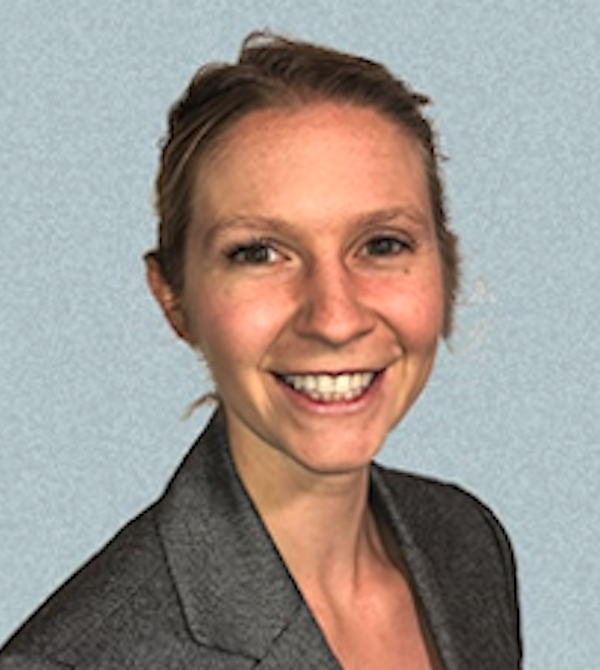CU Endocrinology Fellowship Training Pathways
Two training pathways are available to CU Endocrinology fellows:
- 2-year clinical-educator track
- 3-year research intensive track
- Fellowship applicants apply to a single CU Endocrinology program.
- New fellows work with an assigned career mentor and the fellowship program leadership to create a plan for the 2nd year of fellowship (and 3rd year, when applicable) that will best support their educational needs and career goals.
- Fellows meet with the Endocrine Division research faculty and collaborating faculty in other departments/divisions early in the first year to learn about the diverse research opportunities available to them.
- Fellows should select a training pathway by the middle of the 1st year.
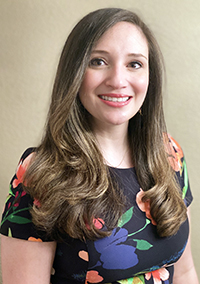
Our program provides you with the opportunity to designate whether you will pursue the clinician-educator or research track at the end of the first year, giving you time to explore both options. Our institution has multiple opportunities available to build the foundation of your career, regardless of which track you choose, making this a difficult decision. I ultimately pursued the research track and have been involved in translational and clinical research and gained skills in study design and execution, data gathering and analysis, manuscript preparation and grant writing, all through accessible campus-wide resources and approachable mentors made readily available to endocrine fellows.- Layla Abushamat, MD, CU Endocrinology Fellow Class of 2020
2-Year Clinical-Educator Track
The CU Endocrinology fellowship program provides outstanding training for individuals who are interested in a future as a clinical-educator, including for those who aspire to work at an academic medical center or teaching hospital.
Fellows in the clinical-educator track complete the same clinically focused first year as the research intensive fellows, but their second year is tailored to their own educational goals.
All fellows (both in the clinical-educator and research tracks) will select a Faculty Mentorship Committee. This group will provide additional guidance and support to the fellow as they navigate clinical, research and educational experiences during their 2nd +/- 3rd year. The Committee can also provide advice on career planning beyond fellowship.
The typical clinical training experience of a clinical-educator fellow during the 2nd year is as follows:
- Second-year fellows participate in block rotations in lipids, metabolic bone disease, reproductive endocrinology (including transgender health), thyroid cancer, and diabetes. The diabetes block includes clinics focused on the management of diabetes in pregnancy, diabetes complications, cystic fibrosis-related diabetes, transplant diabetes, young adults with diabetes (transitions clinic), and diabetes technology, as well as time with the glucose management team (GMT), an inpatient diabetes consultative service at the University of Colorado Hospital (no call or weekends). Fellows also have the opportunity to participate in elective clinics of their choice.
- Weekly continuity clinics at UCH and RMR VAMC
- 4-6 weeks of inpatient endocrine consults
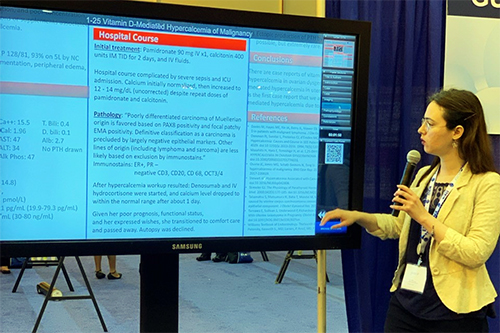
All clinical-educator fellows complete either a mentored research project or a QI project during the 2nd year. GME’s Quality and Safety Academy offers relevant training in quality improvement and patient safety to University of Colorado residents, fellows and faculty. There are also opportunities for fellows to participate in resident and medical student education. Fellows can also take advantage of formal training opportunities provided by the Academy of Medical Educators.
This program offers a breadth and depth of clinical experiences in a tertiary center, a VA and an inner-city hospital that I think is unrivaled across the country. What is great clinically is that we have nationally and internationally recognized clinical expertise to help our fellows manage and learn from the diverse endocrine pathology we see. I currently have what I consider to be the world’s best job as a translational researcher in diabetes; our research team studies youth and adults with type 1 and type 2 diabetes and we use animal models to unravel the mechanisms contributing to decreased exercise tolerance and premature cardiovascular disease in diabetes.
Jane EB Reusch, MD, Professor of Medicine, Bioengineering and Biochemistry
2018 American Diabetes Association President for Medicine and Science
3-Year Research Intensive Track
During the 2nd and 3rd years, fellows dedicate the majority (~70- 75%) of their time engaged in a mentored research experience. The type of research could include basic studies in the cellular and molecular biology of endocrine tumors, human physiological studies on metabolism, appetite and weight regulation, clinical studies of new therapeutic approaches in diabetes, thyroid cancer or other areas, to translational and outcome studies in topics related to endocrinology and diabetes.
The typical clinical training experience of a second-year research fellow is as follows:
- Research fellows participate in the same second year block rotations as the clinical-educator fellows, but their clinical requirements are less stringent
- Research fellows attend a total of 1-2 half-days of clinic per week, including one continuity clinic per week.
- 2-3 weeks of inpatient endocrine consults.
Third year research fellows have one half-day of continuity clinic per week and no other required inpatient our outpatient clinical duties.
All research fellows complete a QI project during the 2nd year and have the option to participate in
the same educational and teaching opportunities (eg, medical student teaching) as the clinical-educator fellows.
Research fellows have the opportunity to participate in formal coursework in grant writing, statistics, molecular biology, and other topics as appropriate for their area of study. Fellows will be trained in study design, IRB submissions, the performance of cutting-edge research methods under the supervision of their research mentor, data analysis, scientific writing, and the presentation of research results. Fellows have a formal Faculty Mentorship Committee that will work with their research mentor to ensure the training experience is on track and productive for them.
Faculty Mentorship
Many fellows will choose to conduct their research under the mentorship of a CU Endocrinology faculty member; however, others may choose to work with investigators in other divisions/departments on the Anschutz Medical Campus.
Support for research training can come from a VA research slot (2nd year) or from one of the NIH funded T32 training grants on campus, including the T32 in Metabolism, Obesity and Diabetes within the Endocrine Division.
In addition to research going on within the core of the Endocrine Division itself, there are many other resources dedicated to endocrine research at CU.
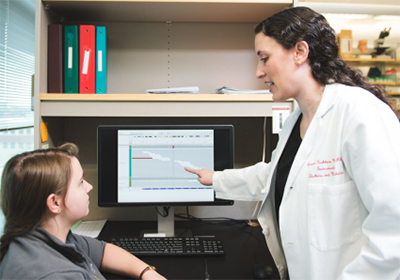
Research Resources at CU
- The world renowned Barbara Davis Center, which is committed to studying the immunopathogenesis of type 1 diabetes and developing innovative therapies for this condition.
- The Anschutz Health and Wellness Center and NIH funded Nutrition Obesity Research Center, which have more than 100 researchers studying obesity and related metabolic disorders from the molecular/cellular level to public health interventions.
- The University of Colorado Cancer Center, which supports research in thyroid cancer and other endocrine neo-plasms.
- The Center for Women’s Health Research and the Investigations in Metabolism, Aging, Gender and Exercise (IMAGE) group.
- VA GRECC, which carries out a large number of research studies related to aging.
Highlights from the CU Endocrinology Research Fellow
| Fellowship Training and Beyond | |
Rebecca Rosenberg, DO | "I came into fellowship knowing I wanted to do research, specifically knowing that I wanted to do exercise research in participants with overweight and obesity. Through working with my mentors, Dr. Catenacci and Dr. Creasy, I was able to further dive into the area of behavior timing (i.e. The time of day we choose to perform activities) and how this may affect the effectiveness of exercise and eating behavior. I have collaborated with circadian physiology researchers across the state and have just started my own project investigating the time of day of exercise on glucose metabolism in participants with prediabetes." |
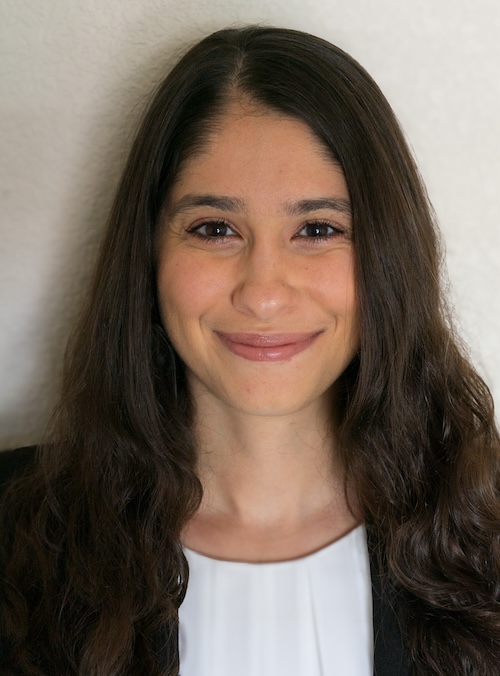 Salwa Zahalka, MD | "Throughout my clinical training, I developed interests in quality improvement (QI) and diabetes technology access. With the support of our Division, I was fortunate to build on these interests in the Leaders in Informatics, Quality and Systems (LInQS) Fellowship. The LInQS fellowship has been an incredible opportunity for robust mentorship and to develop QI skills and experience to carry forward into my career." |
Adnin Zaman, MD 2017-2021 | "We see so many interesting cases that it was really hard for me to pick a research focus. I came into fellowship with a strong passion for reproductive endocrinology and PCOS research, and developed a deep interest in obesity treatment along the way." "I found the opportunity meld my two interests and am currently studying how the use of combined hormonal contraceptives affect weight loss and maintenance in premenopausal women with overweight/obesity who are actively trying to lose weight within a behavioral weight loss trial." |
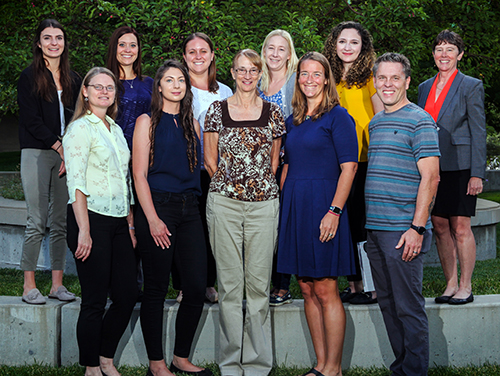
While many of our previous fellows have been unsure about whether they see themselves as eventually leading their own research program, many have a desire to devote a period of their fellowship training to a focused research experience to really
answer the question:
Do I want to make research part of my career?
The research intensive fellowship track at CU gives individuals just such an opportunity, an opportunity that has led successful research careers for many past trainees.
